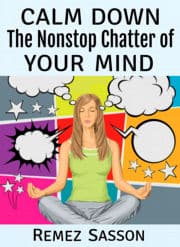
“I never found the companion that was so companionable as solitude. We are, for the most part, more lonely when we go abroad among men than when we stay in our chambers.”
– Henry David Thoreau-
You don’t need to be a monk to find solitude, nor do you need to be a hermit to enjoy it.
Solitude is a lost art in these days of ultra-connectedness, and while I don’t bemoan the beauty of this global community, I do think there’s a need to step back from it on a regular basis.
Some of my favorite activities include sitting in front of the ocean, still, contemplating … walking, alone with my thoughts … disconnecting and just writing… finding quiet with a good novel… taking a solitary bath.
Don’t get me wrong: I love being with loved ones, and walking with a friend, watching the sunset with my wife, or reading a book with my child are also among my absolute favorite things in the world.
But solitude, in these days as much as ever, is an absolute necessity.
The Benefits of Solitude
The best art is created in solitude, for good reason: it’s only when we are alone that we can reach into ourselves and find truth, beauty, and soul.
Some of the most famous philosophers took daily walks, and it was on these walks that they found their deepest thoughts.
My best writing, and in fact, the best of anything I’ve done, was created in solitude.
Just a few of the benefits I’ve found from solitude:
- Time we spend alone helps us get to know ourselves
- We face our demons and deal with them
- space to create
- Space to unwind and find peace
- time to reflect on what we’ve done, and learn from it
- isolation from the influences of other helps us to find our own voice
- quiet helps us to appreciate the smaller things that get lost in the roar
There are many more benefits, but that’s to get you started. The real benefits of solitude cannot be expressed through words, but must be found in doing.
How to Find Solitude
You start by disconnecting.
Take every means of connecting with others, and sever them. Disconnect from email, from Facebook and Twitter and MySpace, from forums and social media, from instant messaging and Skype, from news websites and blogs. Turn off your mobile device and phones.
Turn off the computer … unless you’re going to use the computer to create, in which case, shut off the Internet, close your browser, and shut down every other program used to connect with others.
The next steps depend on which of two strategies you use:
1. Holing yourself up.
This can be done in your office, by shutting the door and/or using headphones and the calming music of your choice.
If possible, let coworkers know you can’t be disturbed during a certain block of your day. Or it can be done at home, by finding a quiet space, shutting the door if you can, or using headphones.
The key is to find a way to shut out the outside world, including co-workers or those who live with you.
2. Getting away.
My favorite way to find solitude, actually. Get out the door, and enjoy the outdoors. Take a walk, find a park or a beach or a mountain, find a quiet coffee shop, find a shady spot to rest. People watch, or nature watch.
Other tips:
- Try taking a quiet, relaxing bath from time to time.
- Curl up with a good novel.
- If you’re married with kids, ask your spouse to give you some time off to be alone, and then return the favor. Make it a regular swap.
- Take a walk every day.
- Get into work earlier, and work in quiet.
- Have a nice cup of tea.
- Try a regular time each day when you’re disconnected.
- Try sitting still, and focusing on your breath as it comes in and goes out. As your mind wanders to thoughts of the past and future, make a patient note of that, then gently return to your breathing.
“I live in that solitude which is painful in youth, but delicious in the years of maturity.”
– Albert Einstein –
Article written by Leo Babauta
Source: – zenhabits.net

